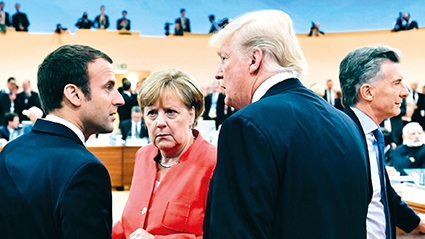New Iranian Sanctions & the South Caucasus
On November 5, The Trump administration re-imposed sanctions on Iran following Washington’s decision to withdraw from the Joint Comprehensive Plan of Action (JCPOA) signed in 2015. Following the decision on withdrawal, the Iranian Foreign Ministry spokesman Bahram Qasemi told state TV that his country had “the knowledge and the capability to manage the country's economic affairs.”
The worst disagreements coming as a result of the US decision were seen between the European and Russian counterparts. Both were against the break-up and still remain strong believers in the JCPOA. In order to diminish the economic effect on Europe, a special clearing house was designed to allow European companies that trade with Iran to bypass the new US sanctions. It was reported that the clearing house will be established within several months either in France or Germany.
The Europeans came up with the idea of the clearing house, also known as a “Special Purpose Vehicle” (SPV), to show Iran that Europe is still a strong supporter of the 2015 nuclear deal and that the SPV will even allow the European Union to expand business with Tehran.
While analysts discuss how the new sanctions will impact Iran and the world oil prices, it is interesting how it will influence the South Caucasus. It is clear that the region is important for the US in exerting pressure on Iran. One of the major reasons the US National Security Adviser John Bolton recently visited the South Caucasus countries was to enhance Iran’s isolation. The US remembers well how Iranians acted previously, before the 2015 agreement, using Armenian and other regional banks to circumvent the sanctions. Even though Washington exempted eight countries from new sanctions, none of them is from the South Caucasus.
Since one of the major goals of new US sanctions is to reduce Iran's oil exports to zero, Georgia, Armenia and Azerbaijan will not be directly impacted. However, although none of the three states in fact uses or transports Iranian crude, all three sometimes use Iranian natural gas either for transit or commercial usage.
For example, Armenia, where a major portion of gas is imported from Russia (via Georgia), also imported about 400 million cubic meters of gas from Iran in 2017, in exchange for which it sends electricity to Iran. In late 2017, there was even an agreement through which Yerevan would increase gas imports from Iran by some 25%, again in exchange for electricity. Now with the new sanctions in force, those plans are likely to be shelved. Moreover, Armenia’s position will be further worsened since the US sanctions will also touch other parts of the Iranian economy. Yerevan will now have fewer chances to build new pipelines or railways from Iran to Georgia in order to be a transit point. Talks around the construction of a $3.7 billion railway are stalled as there are difficulties finding finances for the project. Another reason is that neighboring Azerbaijan already has the necessary pipeline infrastructure and the Baku-Tbilisi-Kars (BTK) railway.
Perhaps Azerbaijan is the country which might benefit most from the new US sanctions, as global oil prices are likely to rise. Since natural gas prices are mostly indexed to oil prices, Baku might see a sudden growth in revenues.
Sanctions-stricken Iran’s influence will be curtailed in the South Caucasus region. The diminution of Iranian economic activities in the region will be followed by a decline in the country’s geopolitical force. In that regard, Russia is to reap the most fruit.
Russia and Iran have long been geopolitical rivals. Russia, for instance, wants to obstruct any Iranian moves to establish Russian-influence-free pipelines or railways to Armenia and Georgia. Now it will be easier for Moscow to block any Iranian initiatives. Yet both countries will nevertheless work together to block Western-led infrastructure projects. Another common interest will be to avoid any foreign military presence in the region, particularly in Georgia.
Iran already lags far behind its regional competitors in terms of economic and military influence in the region, and now the country is set lose more in the South Caucasus. Those geopolitical impetuses which existed before, primarily Europe’s willingness (however unsuccessful) to diversify its gas market from Russian gas, are now unlikely to bring results.
The next several months will show how negative the new sanctions will be for the region. However, one argument is clear: Iran, which hoped, following the successful negotiations and the lifting of restrictions in 2015, to increase its involvement in the South Caucasus, is likely lose the momentum it enjoyed. The European and Russian decision to stay in JCPOA might help, but as many believe, the US withdrawal is crucial.
By Emil Avdaliani
Photo: Emmanuel Macron, Angela Merkel, and Donald Trump. By John Macdougall/AFP/Getty Images











